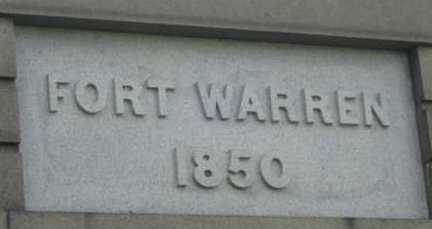By Kathleen Barker
On 13 August 2011, members of the Education Department spent a beautiful day on Georges Island, part of the Boston Harbor Islands National Recreation Area.

Our day began with an exploration of Fort Warren, a National Historic Landmark built between 1834 and 1860. Thanks to its strategic location overlooking the shipping channel into Boston’s inner harbor, the fort became a crucial part of Boston’s coastal defense plan during the Civil War. Fort Warren also served as a recruiting and training camp for Massachusetts regiments of the Union Army, as well as a Confederate prisoner-of-war camp. The first prisoners of war, including 155 political prisoners and over 600 military prisoners, arrived in October 1861. Perhaps the most famous Civil War prisoner held at Fort Warren was Alexander H. Stephens, Vice-President of the Confederacy, who was held there from 25 May – 13 October 1865. Enthusiastic visitors can still take a peek into the cell occupied by Stephens during his stay on the island. Other interesting nooks and crannies to explore include the fort’s bakery, the old hospital, and a powder magazine. Brave souls can also explore the dark arch (Bastion A), a former storage area and recreation hall full of mysterious rooms and dim corners best explored by flashlight!

In addition to roaming the fort, we also enjoyed a fantastic talk by Dr. Christian Samito, a practicing lawyer and a faculty member at Boston University School of Law, where he teaches courses on the legal history of the Civil War and Reconstruction eras. Education staff members have been working with Chris throughout the summer on a series of public programs and teacher workshops related to issues of citizenship and Civil War military service. During this particular talk, which was co-sponsored by the MHS, Chris discussed how African American and Irish American soldiers influenced the modern vision of national citizenship that developed during the Civil War era. By serving in the Union Army, African Americans and Irish Americans demonstrated their loyalty to the United States and strengthened their American identity. While their experiences differed greatly, both groups cited their participation in Union efforts as they advocated for the expansion of citizenship rights after 1865. In the years following the war’s end, African Americans gained access to legal and political processes from which they had previously been excluded on the basis of race, and Irish Americans helped to cement recognition of their full citizenship through naturalization. For more information about this topic, pick up a copy of Chris’s recent book, Becoming American under Fire: Irish Americans, African Americans, and the Politics of Citizenship during the Civil War Era, published by Cornell University Press.
To learn more about Boston and Fort Warren’s role as a site of diplomatic intrigue, join MHS staff members on Georges Island at 1:45 P.M. on Saturday, September 17th, when we present “The Trent Affair.” In the fall of 1861, Jefferson Davis sent diplomats James Mason of Virginia and John Slidell of Louisiana to Europe seeking support and recognition for the Confederacy. Eluding the Union blockade, the Southerners reached Cuba, where they boarded a British mail steamer, the Trent, for passage across the Atlantic Ocean. On 8 November 1861, the ship was seized and its Confederate diplomats imprisoned at Fort Warren. MHS Education and Library staff members will discuss the details of the event; Mason, Slidell and prisoner life at Fort Warren; and the important role the Trent Affair played in Anglo-American relations. We hope to see you there!
This event will take place on Georges Island. For information about ferry tickets and schedules, please visit the Boston Harbor Islands Partnership website.



